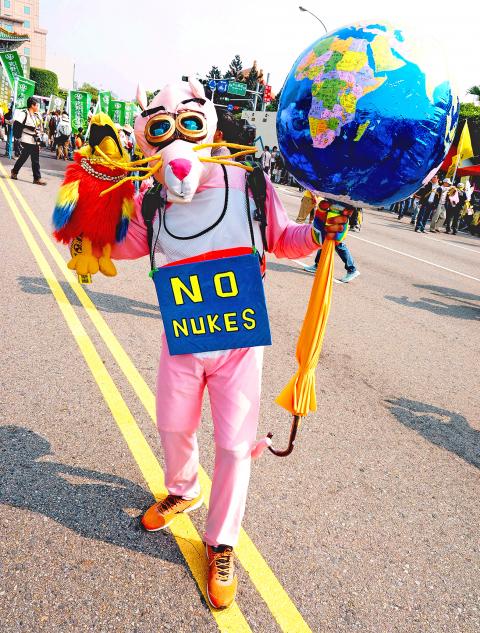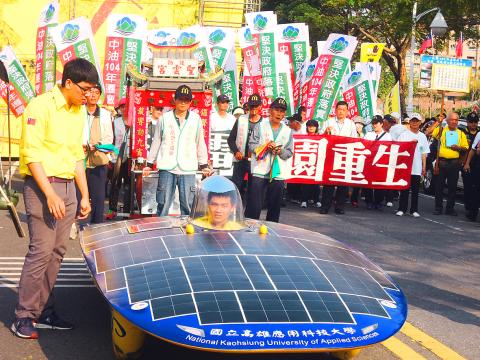Tens of thousands of people opposed to nuclear energy yesterday came together nationwide in antinuclear parades and rallies, joining an alliance of civic groups to raise awareness about perceived problems with the nation’s nuclear policies.
In Taipei, environmental activists and residents from New Taipei City’s Jinshan (金山) and Wanli (萬里) districts took the stage as crowds flocked to Ketagalan Boulevard.
Responding to this year’s theme — to “bid farewell” to nuclear energy — many held banners or props bearing elegiac messages, such as “Nuclear Energy RIP” and signs bearing the Chinese character tien (奠), a common item displayed at traditional Taiwanese funerals, to mourn the deceased.

Photo: EPA
Although the Fourth Nuclear Power Plant in New Taipei City’s Gongliao District (貢寮) has been shuttered since last year after construction was halted following a safety assessment, the plant’s maintenance fees amount to billions of New Taiwan dollars every year, and the government should therefore demolish the plant, Green Citizens’ Action Alliance secretary-general Tsuei Su-hsin (崔愫欣) said.
With the Jinshan and Guoshen nuclear plants in New Taipei City’s Shihmen (石門) and Wanli districts respectively approaching retirement age, problems retrieving spent fuel rods during maintenance and storage pools at the Jinshan plant nearing capacity, the government must not extend the service life of the facilities, Northern Coast Anti-Nuclear Action Alliance chairperson Hsu Fu-hsiung (許富雄) said.
Wu Wen-chang (吳文樟), a Gongliao resident, accused state-run Taiwan Power Co (Taipower, 台電) of plotting to start operations of the Fourth Nuclear Power Plant by browbeating Taiwanese with a power shortage.

Photo: Ke Yu-hao, Taipei Times
He said that by simultaneously carrying out maintenance at a large number of coal-fired power plants, including the Taichung Power Plant, Taipower plans to throttle the nation’s surplus electricity supply from more than 20 percent to about 3 percent, forcing the public to accept the opening of the Gongliao plant.
Tao Aborigine and Orchid Island (Lanyu, 蘭嶼) resident Syamen Womzas said the government has yet to honor a promise it made 12 years ago to relocate nuclear waste stored in his hometown.
“The government stored nuclear waste on Lanyu through deception. The residents never agreed to the plan. It is very unfair to us who do not use nuclear energy. We hope that the government relocates the waste soon,” Syamen Womzas said.
Piho Yuhaw, an Atayal Aborigine from Yilan’s Nanao Township (南澳), said government authorities are conducting geological assessments to set up a deep geological repository on the border of Yilan and Hualien counties, near his home.
He said the government targeted land reserved for Aboriginal people whenever the storage of nuclear waste comes up, calling it an act of bullying minorities and a violation of the Aboriginal Basic Act (原住民基本法), which stipulates that the government must not go against Aboriginal groups’ will to store harmful substances on their land.
He said that nuclear waste storage is an issue, but Taiwan must not overlook the larger picture, which is to abolish nuclear energy.
To demonstrate how alternative energy sources can be effectively utilized, Lee Yung-tsung (李永宗), a wind energy researcher based in Chiayi County, set up two stationary bicycles that collected kinetic energy from pedaling volunteers and stored it in a lead-acid battery that was used to power a coffee machine and cell phone charging ports.
“Hopefully, through this device, people will understand that electricity is difficult to come by, that even after exerting so much strength, the electricity generated can only power so few household applications,” Lee said.
In southern Taiwan, led by a religious procession, about 10,000 protesters marched through downtown Tainan, demanding a nuclear-free homeland.
A local antinuclear organization called for the government to recognize the public sentiment toward abolishing nuclear plants nationwide, adding that it is the citizens’ right and obligation to fight for a green homeland and the freedom from nuclear fear.
Protesters headed by educators and parents from nearby Yunlin County also joined the rally in Tainan, saying they are fighting for the well-being of their children.
Meanwhile, about 100 antinuclear protesters amassed at four major crossroads in downtown Taitung County, calling for the government to remove nuclear waste from the county.
Activists performed a skit in which they pretended to bury the four nuclear plants in Taiwan.
Antinuclear activist and aboriginal folk musician Nabu said that the county has the potential to develop renewable energy, and Taitung citizens are firm on their antinuclear stance.
In outlying island Penghu, an antinuclear rally was joined by several environmental groups and Penghu County Commissioner Chen Kuang-fu (陳光復).
Protesters on bikes gathered in front of Taipower’s office to stage a demonstration, saying that they want to put an end to nuclear power and demand an aggressive energy policy reform.
A series of antinuclear protests were sparked soon after the Ministry of Economic Affairs listed the county’s Wangan Township (望安) among its two preferred locations for storing low-radiation nuclear waste in 2009.

INVESTIGATION: The case is the latest instance of a DPP figure being implicated in an espionage network accused of allegedly leaking information to Chinese intelligence Democratic Progressive Party (DPP) member Ho Jen-chieh (何仁傑) was detained and held incommunicado yesterday on suspicion of spying for China during his tenure as assistant to then-minister of foreign affairs Joseph Wu (吳釗燮). The Taipei District Prosecutors’ Office said Ho was implicated during its investigation into alleged spying activities by former Presidential Office consultant Wu Shang-yu (吳尚雨). Prosecutors said there is reason to believe Ho breached the National Security Act (國家安全法) by leaking classified Ministry of Foreign Affairs information to Chinese intelligence. Following interrogation, prosecutors petitioned the Taipei District Court to detain Ho, citing concerns over potential collusion or tampering of evidence. The

NEGOTIATIONS: Taiwan has good relations with Washington and the outlook for the negotiations looks promising, Minister of Economic Affairs J.W. Kuo said Taiwan’s GDP growth this year is expected to decrease by 0.43 to 1.61 percentage points due to the effects of US tariffs, National Development Council (NDC) Minister Paul Liu (劉鏡清) said at a meeting of the legislature’s Economics Committee in Taipei yesterday, citing a preliminary estimate by a private research institution. Taiwan’s economy would be significantly affected by the 32 percent “reciprocal” tariffs slapped by the US, which took effect yesterday, Liu said, adding that GDP growth could fall below 3 percent and potentially even dip below 2 percent to 1.53 percent this year. The council has commissioned another institution

NEGOTIATIONS: The US response to the countermeasures and plans Taiwan presented has been positive, including boosting procurement and investment, the president said Taiwan is included in the first group for trade negotiations with the US, President William Lai (賴清德) said yesterday, as he seeks to shield Taiwanese exporters from a 32 percent tariff. In Washington, US Trade Representative Jamieson Greer said in an interview on Fox News on Thursday that he would speak to his Taiwanese and Israeli counterparts yesterday about tariffs after holding a long discussion with the Vietnamese earlier. US President Donald Trump on Wednesday postponed punishing levies on multiple trade partners, including Taiwan, for three months after trillions of US dollars were wiped off global markets. He has maintained a 10 percent

TRADE: The premier pledged safeguards on ‘Made in Taiwan’ labeling, anti-dumping measures and stricter export controls to strengthen its position in trade talks Products labeled “made in Taiwan” must be genuinely made in Taiwan, Premier Cho Jung-tai (卓榮泰) said yesterday, vowing to enforce strict safeguards against “origin laundering” and initiate anti-dumping investigations to prevent China dumping its products in Taiwan. Cho made the remarks in a discussion session with representatives from industries in Kaohsiung. In response to the US government’s recent announcement of “reciprocal” tariffs on its trading partners, President William Lai (賴清德) and Cho last week began a series of consultations with industry leaders nationwide to gather feedback and address concerns. Taiwanese and US officials held a videoconference on Friday evening to discuss the